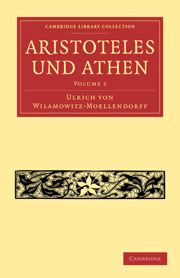Book contents
- Frontmatter
- Contents
- ZWEITES BUCH. Untersuchungen auf grund der aristotelischen Politie
- DRITTES BUCH. Beilagen
- 1 Die phratrie der Demotioniden
- 2 Der erste krieg mit Aegina
- 3 Die chronologie der pentekontaetie
- 4 Solons gedichte
- 5 Die attische skoliensammlung
- 6 Pindaros siebentes pythisches gedicht
- 7 Der process der Eumeniden
- 8 Die zeit der Thesmophoriazusen
- 9 Die rede für Polystratos
- 10 Die paragraphe und Lysias wider Pankleon
- 11 Lysias wider die kornhändler
- 12 Isokrates Panegyrikos 100–114
- 13 Die briefe des Isokrates
- 14 Demosthenes prooemium 55
- 15 Die gedichte des Aristoteles
- Sachregister
2 - Der erste krieg mit Aegina
Published online by Cambridge University Press: 10 November 2010
- Frontmatter
- Contents
- ZWEITES BUCH. Untersuchungen auf grund der aristotelischen Politie
- DRITTES BUCH. Beilagen
- 1 Die phratrie der Demotioniden
- 2 Der erste krieg mit Aegina
- 3 Die chronologie der pentekontaetie
- 4 Solons gedichte
- 5 Die attische skoliensammlung
- 6 Pindaros siebentes pythisches gedicht
- 7 Der process der Eumeniden
- 8 Die zeit der Thesmophoriazusen
- 9 Die rede für Polystratos
- 10 Die paragraphe und Lysias wider Pankleon
- 11 Lysias wider die kornhändler
- 12 Isokrates Panegyrikos 100–114
- 13 Die briefe des Isokrates
- 14 Demosthenes prooemium 55
- 15 Die gedichte des Aristoteles
- Sachregister
Summary
Wir haben über den krieg zwischen Athen und Aegina keine überlieferung ausser bei Herodotos. was er gibt, kann so wie es ist nicht geschichte sein. es geht aber nicht an, davon zu ignoriren, was auf den ersten blick sich als novellistisch kund gibt, und das andere wol oder übel als geschichte zuzustutzen, sondern die analyse des ganzen berichtes muss vorhergehen.
Herodot erzählt (V 79–90) gleich nach dem siege Athens am Euripos, dass Theben sich um hilfe nach Aegina wendet, und die Aegineten die attische küste verwüsten. die Athener werden an der aufnahme des krieges dadurch verhindert, dass Sparta mit einer intervention zu gunsten des Hippias droht.
Das ist das bescheidene tatsächliche, was er über diese zeit beibringt. es schliesst sich seinem berichte über die attische geschichte jener jahre sehr gut an, und man hat nicht die mindeste veranlassung, mehr daran zu zweifeln als an jenem berichte überhaupt. es ist wahr, dass Athen eigentlich hätte losschlagen können, sobald die von Sparta drohende gefahr verschwand. Herodot bedient sich derselben auch nur als eines stilistischen mittels, um einen übergang zu jenen planen der Spartaner zu finden. innerlich motiviren hat er die zurückhaltung der Athener mit einem orakel wollen, das ihnen 30 jahre zu warten gebot, widrigenfalls sie einen sehr langen wechselvollen krieg führen müssten. dies orakel dient ihm auch dazu, seine aeginetischen abschnitte zu verknüpfen. es gehört freilich zu dem was er überliefert erhalten hat, aber dass es hier erscheint, ist auch nur Herodots anordnung, die für uns nicht massgebend ist.
- Type
- Chapter
- Information
- Aristoteles und Athen , pp. 280 - 288Publisher: Cambridge University PressPrint publication year: 2010First published in: 1893



